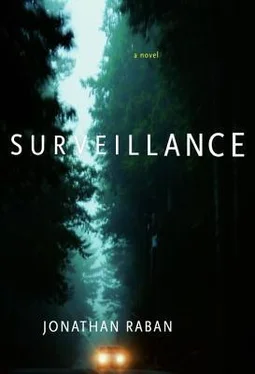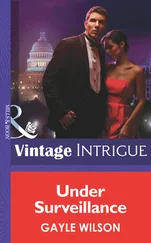He didn’t call. She told herself that it was perhaps best to leave things exactly as they were, a warm memory, unalloyed by complications. Having gone through one bicoastal romance, she’d sworn never to try another. So farewell, Edward, nice to have known you. Or so she tried to feel.
Three weeks later, she was four days late. The Rosemary/Maureen nightmare had probably fucked up her cycle. The night with Edward must have been at least three days before she started ovulating, but sperm have tenacious survival skills. She bought a test from Bartell’s, peed onto the stick thing, and saw lines in both windows. A blood test at the doctor’s the next day confirmed it. She was pregnant.
She was shaken by her own delight. At thirty-eight, with forty looming fast, she took the news as a pure, undeserved gift from gods in whose existence she had no belief at all. Of course she’d have the baby. How could she not?
But then there was the question of Edward. It would take five minutes to locate him. No need to snoop through the Alexis guest register; all she had to do was get the list of speakers at his conference. But in the last three weeks, Edward had rather dwindled in her estimation. It wasn’t that he hadn’t phoned, more that in retrospect his charming, ironic manners had come to seem a bit too easy, too practiced, too ostentatiously East Coast. It was as if all he was was manners. When she thought about him, she realized that she didn’t know a person so much as Williams College, Yale Law School, Westchester, and the Village. If she were to tell him this news, she didn’t have an inkling as to how he might respond. Horror, as likely as not, and a gentlemanly offer to arrange for an abortion.
As the slogan said, it was the woman’s right to choose. And faced with this most personal, impulsive, and daring decision — the biggest decision of her life — Lucy thought that the last person she wanted to consult was a lawyer, especially one as quick-minded and fluently logical as Edward had shown himself to be at dinner. She was frightened that Yale Law School might be horribly adept at talking her out of it, even though she held out a distant hope that Greenwich Village might be more understanding of her need to have the baby.
She forced herself not to find out Edward’s last name. There had been times in the last few years when the thought did cross her mind that a New York lawyer dealing in intellectual property rights, the hottest specialty in the Internet age, must be unbelievably rich, and that she might sort of owe it to Alida to make her existence known to this legal tycoon. But each time the thought came into view, she quashed it: to follow up on it now would put her own behavior back then in a very bad light indeed.
Lucy was glad Alida had inherited Edward’s hair and height, and much relieved she hadn’t got his nose.
TAD WAS ANGRY. He was angry with himself, angry with the presidency, angry with the nation, angry with the century. That much was rational, justifiable. In his view, only the ignorant, the hopelessly self-preoccupied, the Halliburton fat cats, and the mad Christian zealots were in any position not to be angry. Decent people now were angry people, and what America needed at this low moment in its history was more anger, not less.
But lately his own anger had been metastasizing at such speed, and in all directions, that it frightened him. It felt terminal.
He was angry with the landlord, that smarmy shyster Chinese bully so obviously bent on robbing him, Alida, and everyone else of their rightful homes. He hated the man’s ill-fitting double-breasted suit, his droopy eyelids, his real estate jargon, his vile heh-heh-heh! laugh. His ownership of the Acropolis was a prime symbol of how the world had lately fallen into the hands of grifters, liars, and cheats.
He was angry with Lucy, so willfully deaf and blind to the reality of what was happening, with her smug little sarcasms, her tolerant smiles. Aren’t you overreacting? That drove Tad wild.
He was angry with total strangers. One day last week, two women yakking in a supermarket and blocking his passage with their carts had managed to rouse in Tad his inner murderer. When he saw moms on the school run driving Hummers, he wanted to fling bricks through their tinted fucking windows. A knot of lawyers in Armani suits and tasseled loafers, talking outside the Rainier Club after a long and evidently profitable lunch, made him want to reach for his thought machine-gun.
Such anger was alien to him. As a lifelong student of Stanislavski, Tad had always taken pride in losing himself inside a character. He believed that a certain capacity for self-abnegation was an essential part of the actor’s job. He’d gone to Zen workshops, to meditate himself nearly out of existence. Through dire professional disappointments, like the part he’d so nearly won in the New York premiere of Albee’s The Play About the Baby, as through grief after Michael’s death, he’d been able to find in himself a quiet, deep-breathing place from where he could contemplate the worst with something not too far from equanimity.
No more. Now he found himself raging like the most psychotic of the poor bastards down in the alley, waving his bottle and howling imprecations at blank windows.
Until Sunday, he’d been unaware of just how dangerously far his disease had spread. It felt closer to demonic possession than he could have conceived when he found his anger boiling up against Alida. He was astonished and terrified by himself.
Unthinkable. Yet the too-familiar shivering, the stiffening of muscles in his cheeks, the seismic disturbance in his foundations, were out of his control. The mad interloper standing in Tad’s shoes was raging internally at Alida the way it raged at the moms in the Hummers. It, not him. It was a thing, not a person — a cancer doing what cancers must.
He’d lain awake all night, pressing his fists into his eyes to stop the tears. It was futile and cowardly of him to blame his anger on the times, which were no excuse for his wanton fury with Alida. He wished he could pray, for redemption and absolution, but he despised sky-god religions; there was nobody up there to pray to. He ached for Michael, the most understanding and level-headed of confessors. At four he clambered out of bed to rummage through his narrow shelf of Buddha books, unopened for years.
Anger. One of the great obstacles to Nirvana, a delusion, a belief in a false I and a false object. “Holding on to anger is like grasping a hot coal with the intent of throwing it at someone else; you are the one who gets burned,” said the Buddha. “You will not be punished for your anger, you will be punished by your anger.” And here was the Dalai Lama:
If we examine how anger or hateful thoughts arise in us, we will find that, generally speaking, they arise when we feel hurt, when we feel that we have been unfairly treated by someone against our expectations. If in that instant we examine carefully the way anger arises, there is a sense that it comes as a protector, comes as a friend that would help our battle or in taking revenge against the person who has inflicted harm on us. So the anger or hateful thought that arises appears to come as a shield or a protector. But in reality that is an illusion. It is a very delusory state of mind.
Anger the false friend: yes, for the last few years Tad had found companionship in his anger. How often had he soothed himself to sleep by plotting the destruction of his enemies, from the president of the United States to the new artistic director at the Rep? Time and again he’d reached out gratefully to his anger as a buddy and a bedfellow; yet on Sunday night with Alida, he’d found himself to be his anger’s slave.
Читать дальше












